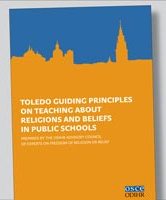The Office for Democratic Institutions and Human Rights (ODIHR) of the Organization for Security and Co-operation in Europe (OSCE), will launch a new guide on preparing curricula for teaching about religions and beliefs in a manner sensitive to human rights concerns on November 28 in the Spanish capital Madrid, ahead of the OSCE's Ministerial Council.
The 134-page publication, "Toledo Guiding Principles on Teaching about Religions and Beliefs in Public School", is designed to assist educators, legislators, teachers and officials in education ministries and in private or religious schools to ensure that teaching about different religions and beliefs is carried out in a fair and balanced manner. The Guidelines highlight procedures and practices concerning the training of those who implement such curricula, and the treatment of the pupils from many
different faith backgrounds who may be the recipients of such teaching.
"It is important for young people to acquire a better understanding of the role that religions play in today's pluralistic world," the ODIHR Director, Ambassador Christian Strohal, said in his forewords to the book. "The need for such education will continue to grow as different cultures and identities interact with each other through travel, commerce, media or migration."
It is recommended that the OSCE participating States disseminate the Toledo Guiding Principles among teachers, school administrative staff, students associations, parents organizations, education policy makers, and all parties that could be interested in teaching about religions and beliefs, and draw upon these Principles when such teaching is developed or implemented.
The Guiding Principles were developed by the ODIHR Advisory Council on Freedom of Religion or Belief, together with other leading experts. They list procedures for assuring fairness in the development of curricula, as well as treatment of pupils from many different faith backgrounds. The Spanish 2007 OSCE Chairmanship paid for the publication of the booklet.


